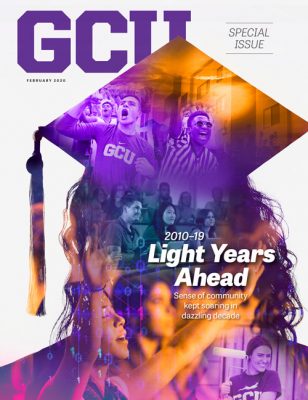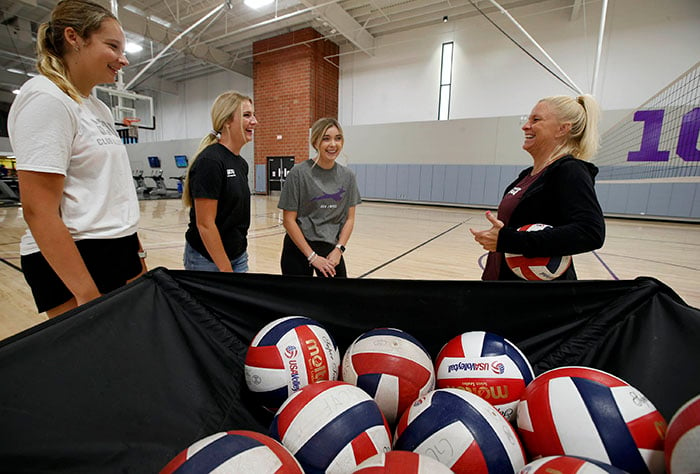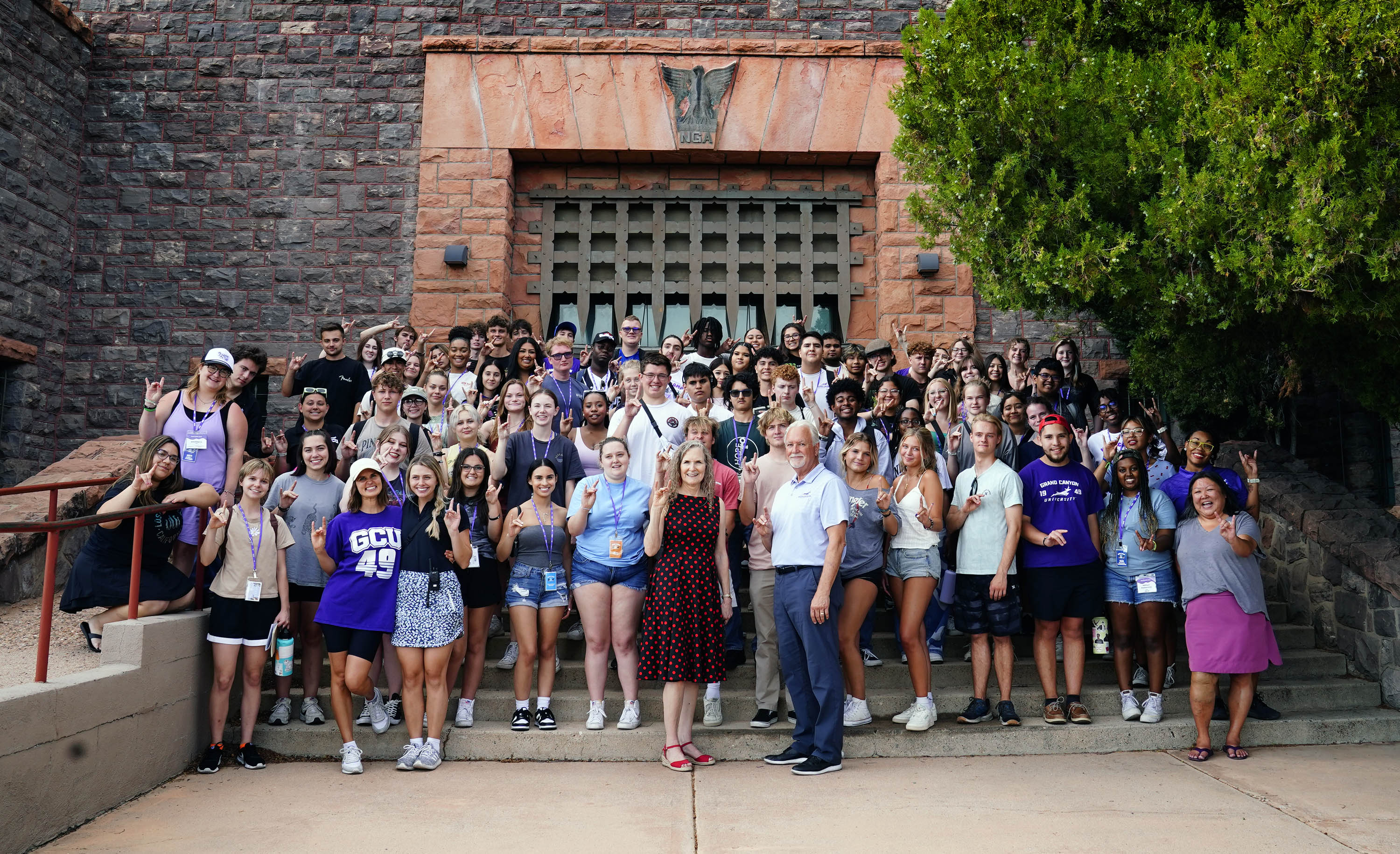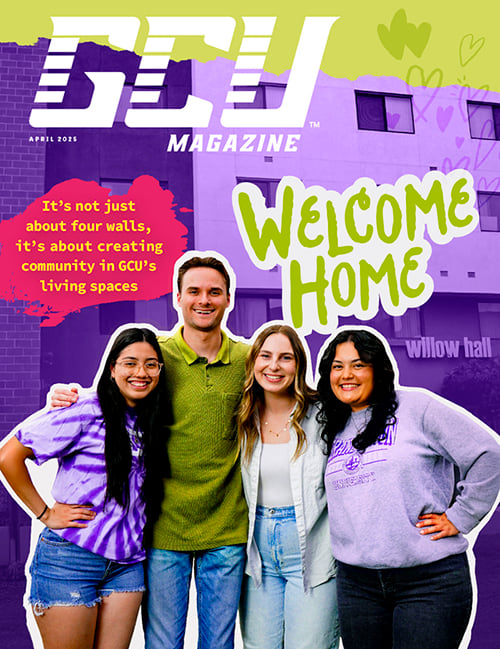
Editor's note: This story is reprinted from the February issue of GCU Magazine, an inside look at the unprecedented growth of the University in the last decade. To read the digital version of the magazine, click here.
By Rick Vacek
GCU Magazine
They said it shouldn’t be done … couldn’t be done … wouldn’t be done.
A university shouldn’t approach the stock market with an initial public offering at the height of the worst U.S. economy since the Great Depression.

If that offering somehow went through, that institution couldn’t possibly double the size of its campus and curriculum and increase almost sevenfold the number of ground students in 10 years … without raising their tuition.
Even upon reaching those seemingly unreachable markers, that higher-learning innovator wouldn’t dare pile a cascade of initiatives on its plate – revolutionizing the way students are taught both on campus and online, fostering a campus community filled with spirit and spirituality, and transforming a neighborhood with its own sweat equity. And then while doing all that, it surely wouldn’t return to nonprofit status.
Welcome to what happened at Grand Canyon University from 2010 to 2019, a dazzling decade of determination, discovery and, yes, a little defiance.
“We do what others say can’t be done,” said Will Gonzalez, Chairman of the GCU Board of Trustees, “and we do it every … single … day.”
But to put into proper perspective what happened in a precedent-setting era, you need to have seen it all. Here, then, is that story, told through the eyes of some people who were here for the whole thing. They didn’t have shouldn’t, couldn’t or wouldn’t in their vocabulary … and wouldn’t have it any other way.
****
WHEN WILL GONZALEZ joined the Board of Trustees in 2007, the consensus was that the hiring of a new GCU president simply would facilitate a transition.
Then they met with Brian Mueller and quickly realized that he was a catalyst, not a caretaker.

“I tell people, ‘The only vote that ever mattered was hiring Brian,’” said Gonzalez, a GCU graduate who has worked in the City of Phoenix Prosecutor’s Office since 1996.
Unquestionably, Mueller was the engineer of what quickly became the Little Engine That Could. Talk to anyone who has worked with him for a while, and this is the kind of thing you hear:
“He’s so dynamic and has such passion and is so challenging to you and championing you to rise to the occasion,” said Dr. Kimberly LaPrade, Dean of the College of Education. “Who can keep up with Brian? I’m pedaling as fast as I can, but he’s already thinking 10 years ahead of me.”
Mueller likens his leadership group to a rock band that actually stayed together, and he is grateful that so many people agreed to join him on the GCU quest when it wasn’t such an attractive option.
But GCU’s Provost, Dr. Hank Radda, said their loyalty shouldn’t be a surprise at all. It’s all about the collaboration Mueller fosters:
“He creates and he brings on other team members who really can get on board with a vision. They understand that he wants people to work collaboratively to accomplish something.
“He puts markers out there so you really understand your progress – we’re all looking at it together. There’s a clarity of purpose, clarity of path. And then when there are things that are hard or difficult, you collaborate to overcome them, so it’s truly a team effort.”
Example: the advent of the Learning Lounge, a free tutoring initiative for K-12 students that begat the Students Inspiring Students scholarship program. Just like that, local students who might not have been able to afford college were getting free tuition to attend GCU and were paying it forward by educating their younger counterparts. Gonzalez considers it one of Mueller’s greatest achievements.
“That signifies what we’re trying to do, with a higher purpose,” Gonzalez said. “People say, ‘Not that kid,’ and say they can’t do it. Here, they can. Here, they can grow.”
What one word would he use to describe the last 10 years? “Transformational. We haven’t just redefined what a private Christian university should be. We’ve redefined what higher education should be.”
****
JERRY COLANGELO is all about redefining things. Except for his recent consulting job with the Philadelphia 76ers, his various sports roles always were the result of a league’s expansion.
So when Mueller asked the former managing partner of the Phoenix Suns, Arizona Diamondbacks and numerous other franchises to help him build GCU into a major player, the project fit his skill set perfectly.

The University was like an expansion team.
“Which means it’s starting with ground zero, creating a plan, having vision and going after it,” Colangelo said. “So it’s always been about building. This was absolutely very, very similar. Different product, but it was the same course of action. It was like second nature, I guess.”
Make no mistake: While hiring Mueller obviously was the No. 1 development of the University’s recent history, bringing Colangelo on board was 1A.
The move to NCAA Division I and quick success at that level, the building of the Basketball Practice Facility, the expansion of GCU Arena, the establishment of a sports business school – none of it happens, or happens as quickly, without Colangelo’s involvement. It was so important, the University renamed its business college the Colangelo College of Business and built the Jerry Colangelo Museum. And there’s only one reason he came.
“It can be summarized in a name, and that was Brian Mueller,” Colangelo said. “I agreed to do it because I believed in him.” Keep in mind that after all of Colangelo’s accomplishments, he’s not easily impressed. But also keep in mind one of his favorite sayings: When someone tells him he can’t do something, not only will he do it, he’ll show them how.
Sounds a lot like what Mueller has done.
“Brian was on this fast track in terms of fulfilling his vision, and there was no looking back,” Colangelo said. “To be part of something as exciting as building a university and redeveloping 400 acres of property west of the freeway was a very, very exciting opportunity, just to be part of that.”
And his one word for GCU’s decade?
“Extraordinary. The story of GCU is not only a great story about the growth of a university from small-time to where it is today, it is one of the great business stories in the history of our state and one of the great business stories in the country.”
****
A STORY MUELLER LOVES to tell is Mark Alexander’s reaction the first time he attended a GCU men’s soccer game on campus. It was in 2008, a time when the sense of community – long a valued aspect of what was a small Christian campus – had waned after the University almost closed. Mueller called the campus, which was dark and foreboding at night, “a M*A*S*H* unit without the helicopters.”

“I looked out across the campus, and there was nobody around,” Alexander said. “The Halo Pet Center was right behind the soccer field – dogs were barking, it was dirty and smelly. I sat there and I looked at this and I thought, ‘What have I done? Why did I take this job?’”
Alexander didn’t feel much better about his first office, which contained faculty records and was so small, he had to get out of his chair if someone needed a file from the “M through Z” cabinet. But the Senior Vice President of Curriculum and Publishing for Grand Canyon Education sees a very different place today.
“You come on campus any night when the students are around, and it is not quiet and dark – it’s a very vibrant place,” he said. “You look around it now and say, ‘OK, yeah, this is why we all came here and did this.’”
Has he ever seen an organization like this in his career?
“No,” he said quickly. “This is the most singularly unique work experience I’ve ever had. I’ve worked for software-development companies, and that was really, really fast-moving. I’ve worked for established consulting companies with steady business, but this is nothing like that at all. It has just been extraordinary.”
His one word: “Phenomenal. It really has been a phenomenal ride. It’s gone by so fast. I can’t believe that I’ve been here 11 years.”
****
HANK RADDA was amused awhile back when some visitors from other universities couldn’t believe he had a three-hour meeting with faculty at the start of the academic year. Faculty collaboration is another important piece in the sense of community at GCU.
Asked if he had ever seen this much collaboration elsewhere, Radda’s response was immediate and direct:

“Yeah, but not at this scale. The scale of what Brian does is pretty amazing. There is no one in higher ed doing this. No one. When most accreditors and people come here, they say, ‘How do you have deans that talk to faculty that talk to staff that talk to other vice presidents that talk to … how do you do that?’
“People have no idea how special this is, what Brian has developed in terms of a culture and all people on board to do it – especially in the higher ed space, which is usually very siloed.”
Mueller’s devotion to students is not lost on members of the faculty and administration. Radda likens it to a common scene on campus: people holding the door for each other.
“If the students aren’t successful, none of us exist … not here,” Radda said. “Brian knows how to bring people together, and he models. He walks around campus talking to students, students talk to him, he has them up in the office, he talks to faculty, he talks to community people.
“He’s always asking, ‘What’s the impact, what’s going on?’ Then he pulls us together and says, ‘OK, how do we make it better?’ It could be anything from academics to the food service to the Arena to a walkway. But that’s done with a lot of input from a lot of people and a lot of consensus-building.”
When Radda was asked for his one-word summation of the decade, he responded with “Wow” and seemed to be pondering the difficulty of the question. But after he was asked again …
“I said it … wow!”
OK then. Wow!
****
THE SCENE IN DR. JENNIFER LECH’S first office at GCU in 2004 perfectly describes the then-and-now difference current students could not comprehend as they walk across a spacious campus filled with new buildings.

The Executive Vice President of Academic Affairs and University Registrar was managing 13 temporary workers who shared one phone. They sat at fold-out tables with cream-colored computers that are now obsolete.
Her office was in a closet. And, of course, the building later was torn down.
“You couldn’t be attached to where you were working,” she said. “Your desk, your anything – we were nomads. It’s kind of like growing up without any money; you learn to appreciate, probably more than others, what you have because you’ve seen what it’s like to not have that at all.”
The scene outside the office wasn’t much better. “It was like a ghost town,” she said. But the work it took to drive away the ghosts – in particular, preparing for the initial public offering in the stock market and the first Higher Learning Commission visit after GCU had gone for-profit – made it all worthwhile, as did the attention the University got for its overall academic efforts.
“That expression ‘imitation is the greatest form of flattery’ – other people are doing exactly what it is that we’ve been doing for 10 years,” Lech said. “People didn’t think we could, and then we did, and then they decided they can and so now they want to do the same thing we do.
“We do our thing. That’s just who we are. We don’t worry about other people. We do it right, and we’re all very proud of the graduates that we produce.”
Her 2010-19 wrap-up word made her emotional: “Blessing. It’s not just personally, it’s professionally. My life has been here for 15 years. The kids, the school, everything.”
****
DR. MICHAEL BERGER was one of those 13 temporary workers Lech managed when she first arrived. They have a friendly disagreement over who has more seniority: While he has been here a few months longer, he wasn’t officially full-time until after she started.
But a better measure of his 15-plus years on campus – 10 in Curriculum Services and nearly six as Dean of the College of Doctoral Studies – is T-shirts. Yes, T-shirts.

Anyone who has worked at the University for longer than, oh, a month or two is bound to have some GCU T-shirts. Berger has two huge storage bins of them in addition to the ones in his dresser drawer.
“I haven’t wanted to throw them away because it’s a weird history of logos and color schemes and events and mascots and all kinds of stuff,” he said.
Like Mueller and so many of his fellow GCU T-shirt wearers, he takes special delight in proving the naysayers wrong:
“This place, to a certain extent, is a miracle because everybody here refused to accept that things were impossible. You can’t process that many people. You can’t get a turnaround time that fast. You can’t transfer that many documents. You can’t establish a service-level agreement that works like that. You can’t educate that many people at a distance in that complex of a program.
“Just because it hasn’t been done doesn’t mean it can’t be done. This place has been a very good representation of, ‘OK, well, it hasn’t been done. That just means no one has really tried hard enough or no one has really come at it from a different route.’”
It all culminates three times a year at Commencement, where Berger has volunteered faithfully. There’s a reason for that: He loves the way GCU emphasizes turning a useful degree into gainful employment.
“It’s not just, ‘Here’s a degree, here’s your funny hat, here’s your robe, shoo!’” he said. “No! We care about how they’re going to be successful, how they’re going to get out in the world and make a difference. I think that’s huge.”
His word for the decade: “Meteoric – both in the meteoric rise and in the impact we’ve had on the students and on the higher education landscape.”
****
KIMBERLY LAPRADE and her Associate Dean in the College of Education, Dr. Marjaneh Gilpatrick, started as assistant professors at GCU on the same date – Aug. 20, 2007.
Package deal, right? Nope. They didn’t know each other. The first time they met, they were walking down the hall to get supplies.

But they quickly became acquainted with a deteriorating environment that was so bleak, most of their classes had 3-5 students. LaPrade was thrilled to get six students in a class – she could pair them into groups of three.
“Even though I was an alum,” LaPrade said, “I don’t think I realized the situation I was walking into.”
With fewer than 50 students in the College of Education, GCU no longer was a go-to destination for schools seeking teachers. She was determined to change that when Mueller named her the dean of the college in 2010 – after Gilpatrick was one of the faculty members who did her mock interview.
“She’s done a fabulous job, always pushing us to go further and to reach higher and to see what’s next,” Gilpatrick said. “She’s been the force of stability in the college.”
LaPrade was determined to honor The Promise, which stipulates that the college will assist, at no expense, any graduate of the educator or administrator preparation programs during their first year in the field. She also vowed that the college would earn national accreditation, which was finally accomplished last year.
But here’s the irony: COE has done such a good job of training teachers over the last decade, The Promise rarely needs to be utilized … and COE graduates were in demand well before the accreditation.
There’s a definite sense of community in COE, just as there is across campus.
“You can find your tribe here – in a club, in a sport or an activity, in Chapel, in a college, in a classroom, in a residence hall,” LaPrade said. “There just are so many opportunities. It starts at the very beginning with Move-In – you set foot on this campus and you just are embraced and loved and we move you in. You don’t have to lift a box.”
Their one-word decade descriptions:
LaPrade: “God-driven. I really believe this has been Goddriven. I don’t know how else it could have happened.”
Gilpatrick: “Change. When I think about GCU, I equate it to change, a place where we’re not afraid to change and change for the better.”
****
THE LAST WORD, appropriately, belongs to Mueller, the man who made all this happen through sheer force of will and skill. His word for the 2010-19 era at GCU shouldn’t surprise anyone:
“Community. The single most significant experience or feeling or emotion that I have about this place is the strong sense of caring that people walk away with when they’ve been here. It’s almost inevitable that families come away saying that.”
Employees, too. It’s the place where couldn’t became could. Done deal.
Contact Rick Vacek at (602) 639-8203 or rick.vacek@gcu.edu.










